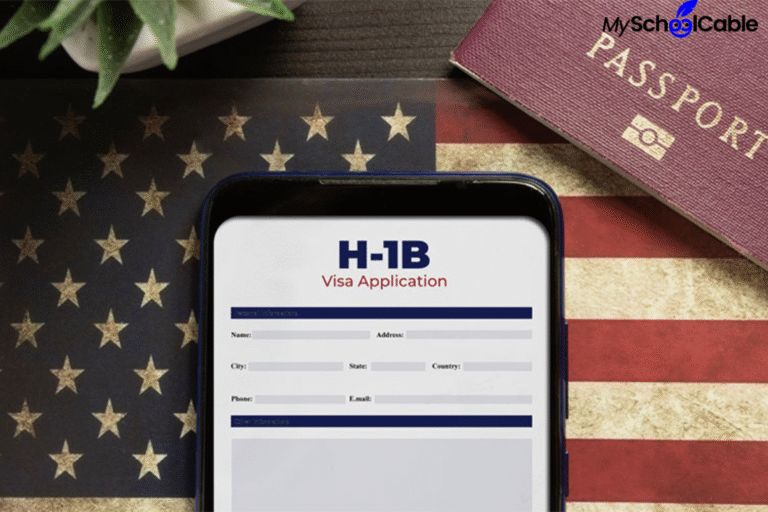Thank You Note for Scholarship: A scholarship is a vote of confidence in your abilities, aspirations, and future that goes beyond simple financial assistance.
Scholarships can greatly lower tuition costs and provide access to experiences that can change a person’s life, regardless of whether they are given for financial need, leadership, or academic achievement.
Sending a thank-you note is a crucial step frequently missed as the excitement subsides. A well-written thank-you note demonstrates professionalism, respect, and gratitude to the organisation or contributor who believed in you. It’s a modest act that has a big effect.
This article will teach you how to write a thank-you note for a scholarship, including what to include, what not to include, and real-world examples to help you confidently and sincerely convey your gratitude.
Regardless of your level of education—high school, college, or graduate—this advice will assist you in creating a message that is memorable, respectful, and sincere.
How to Write a Thank-You Note for a Scholarship
When writing a scholarship thank-you note or letter, you can write to an organisation or a donor. Whichever one you are writing to, there are guidelines and formats to follow. To start with:
Step 1. Address the Letter Using your Contact information
The first step is to address your note. This requires you to use your contact information. Your contact information contains your personal information: your first and last name, email, phone number, and your city.
The name and address of the organisation can then be written beneath the date, which might be written on a different line.
To make sure your contact details are current and there are no spelling mistakes, it is beneficial to proofread this part. This gives the person or group that awards scholarships the information they need to follow up on your letter.
Read Also: How to Write SSP Essay | Full Guide
Step 2. Add a formal greeting
The next step on how to write a scholarship thank you note is to greet your recipient. To get this part right, you must do proper research on who you will be addressing the letter to. Whether you are addressing it to a donor or an organisation, try finding out their appropriate title and full name.
With this information, you may personalise the message and address it. When writing a letter for a group of people, think about using the name of their organisation.
As an alternative, you may use the complete name of the organisation along with a statement like “Dear members.”
Step 3. Have an Opening Paragraph
In order to let the recipient recognize you as the sender, introduce yourself and provide a little background information.
To keep the reader interested and to make the letter’s goal apparent, you can incorporate your message of gratitude in this paragraph.
You can examine the requirements of the institution because some colleges and universities need applicants to send letters of recommendation in a particular format. Depending on the selected structure, this paragraph may include one to three sentences.
Think about including your major, anticipated graduation year, and current status. Use polite words to keep the tone professional and respectful.
Step 4. Write the main content
Use the next two paragraphs to explain your intentions and academic objectives after the introduction. To help the organisation or donor grasp your message and remember your point of view in the future, think about adding particular details and illustrative stories.
You can give specifics if you have the same ideals or characteristics as the organisation that grants scholarships.
Mentioning that your scholarship was awarded by someone whose interests coincide with your own, for instance, may open up prospects. Similar to: Composing a Letter of Recommendation for a Scholarship Application.
Interestingly, you can check out: How to Write a Notarized Letter | Full Guide
Step 5. Express your appreciation
In the final paragraph of your letter, you can convey your thanks once more using a variety of words.
Explain to the recipient of the letter how the scholarship could support several students in pursuing their goals and careers. Think about stating that you plan to get in touch with the contributor or organisation again later.
Step 6. Compose an official conclusion
Use a formal closure like “Sincerely” to wrap up your letter in a professional manner. Below this, sign your name. Use a word processing program to sign the letter and attach it as an image if you are sending a digital copy.
Think about providing the contact details the scholarship office requests, along with your full name. For instance, you might be asked to provide your student ID number by the institution or university.
What to include in a Thank You Note for Scholarship
You can add the following items to your scholarship appreciation letter to make it thorough and interesting:
Expression of gratitude
A letter’s objective can be better understood by an organisation or contributor if it begins with an expression of heartfelt gratitude. A one- or two-sentence message of gratitude typically contains the complete title of the scholarship.
It aids in maintaining the formal structure and clarity of the letter. When making this message, it’s a good idea to concentrate on recent contributions rather than upcoming or previous activities by the donor or organisation.
Status
You might include details about your past accomplishments and current endeavours in your letter of appreciation. Think about identifying your major and outlining the features that pique your interest.
Emphasise how this program can support your career and personal development. To boost the effect of your letter, mention a relevant internship or volunteer experience.
If you’re studying marketing and working as an intern at a marketing and advertising company, for instance, include these experiences to bolster your academic background.
Read: How to Write CPR Certification on Resume | Full Guide
Background data
You might want to include extra information about your personal history because a donor or organisation might want to know more about the scholarship recipients.
For instance, you could talk about your accomplishments and experiences before enrolling in college or university.
You might include details like where you’re from and what drives you to do well in school. Describe the experiences that influenced your decision to pursue a program or topic of study.
Plans and objectives for academics
To give the donor or organisation pertinent information about your aspirations, think about outlining your academic objectives. Talk about your area of interest and any research initiatives you want to undertake.
Include in your letter that you wish to pursue a graduate degree to better your education. By doing this, you may encourage the donor or scholarship organisation to suggest you for other programs in the future. Long-term strategies for your professional path or your future goals can also be discussed.
Cheeck out: How to Write an Agreement Letter | Step-to-step Guide
What Not to include in a scholarship thank-you letter
When writing a scholarship thank you note, there are things you should avoid. Although they look relevant, they are not proper to add.
1. Financial or Personal Struggles in Detail
Talking about how the scholarship has helped you financially is fine, but don’t get too personal or in-depth about your difficulties.
Donors of scholarships want to know how their assistance is enabling you to develop, not how you’re living your life.
Reasons to stay away from: It could come across as awkward or even too personal. You want to show appreciation, not sympathy.
Rather than stating: “I’ve been having trouble paying my rent, buying food, and managing my family’s debt.
Say: “This scholarship has greatly reduced the financial stress of pursuing my education and allowed me to focus more on my academic and career goals.”
2. Negative Language or Complaints
Don’t write anything negative in your letter. Complaints concerning your school, instructors, workload, or anything else unrelated to the scholarship itself go under this category. This is neither the place nor the time, even if you’re telling the truth.
Reasons to stay away from: It could come across as disrespectful to the chance you’ve been given, unprofessional, or ungrateful.
Rather than stating: “My classes have been frustrating this semester and I’m not getting along with some professors…
Say: “I’m enjoying the challenges and opportunities this semester brings, and I’m grateful that your support is helping me make the most of it.”
3. Informal Language, Slang, or Jokes
You should speak professionally and courteously. Steer clear of emoticons, slang, informal expressions, online acronyms, and potentially offensive comedy.
Reasons to stay away from: It could come across as rude or immature, particularly if the giver is an elderly person or a formal institution.
Rather than saying: “Omo, I’m grateful! You guys are the greatest.
Say: “I truly appreciate your kind assistance. It is really important to me and my academic path.
4. Requests for Additional Funds or Possibilities
Never request more help, internships, or career connections in your thank-you note. This is a time to show gratitude, not to ask for anything.
Reasons to stay away from: It could appear opportunistic and divert attention from thankfulness. Additionally, it may cause discomfort for the donor.
Rather than stating: “I was wondering if you could help me with a part-time job or another scholarship.
Say this: “My academic life has changed significantly as a result of your help. I’m determined to take advantage of this chance to develop and give back in the future.
5. Text That Is Too Long or Digressive
Maintain the emphasis of your message. A brief, sincere letter has a greater impact than one that is lengthy and disorganised.
Avoid giving the reader too much information.
Reasons to stay away from: Donors value organised, unambiguous communication since they are frequently busy.
Rather than: A letter of 1,000 words restating the same ideas
Aim for: 3–5 short paragraphs that include:
- A warm greeting
- Genuine thanks
- A brief statement about your goals
- A respectful closing
6. Inaccurate or Generic Content
Avoid copy-pasting or writing a one-size-fits-all letter. Mentioning the wrong donor name, scholarship, or leaving out specifics shows a lack of effort.
Why to avoid: It may seem disingenuous or lazy, and could damage your reputation.
Instead of saying: “Thanks for the scholarship. It really helps.”
Say this: “Thank you for awarding me the [Exact Scholarship Name]. Your generous contribution is helping me pursue my degree in [Your Major] at [Your University].”
Check Out: How to Write Undertaking Letter | Step-by-step Guide
How to Write a thank you note for scholarship Samples
Here are some scholarship thank you note samples you can use to create yours:
Scholarship Thank-you letter Template 1:
Scholarship Thank-you letter Template 2:
Thank-you Note for Scholarship Sample 3
Scholarship Thank-you letter Sample 4
Sample 5
Conclusion
One of the most meaningful ways to show your appreciation and recognize the support that is influencing your academic path is to write a thank-you note for a scholarship. It only needs to be straightforward, courteous, and true.
Spending a few minutes crafting a sincere message can make a big impact on donors and demonstrate that their contributions are genuinely valued.
Your note, whether handwritten or typed, conveys your thanks and personality.
FAQs about How to write Thank You Note for Scholarship
How Do I Write a Thank-You Note for a Scholarship?
To write a thank-you note, follow the steps below:
- Address the Letter Using your Contact information
- Add a formal greeting
- Have an Opening Paragraph
- Write the main content
- Express your appreciation
- Compose an official conclusion
What should I include in my scholarship thank-you letter?
When writing a thank-you letter for a scholarship, ensure you include an Expression of gratitude, your status, background information, and most especially your plans and objectives for academics.
What are the things I shouldn’t discuss when writing a scholarship thank-you letter?
When writing a thank-you note for a scholarship, there are things you shouldn’t talk about. Talking about them can make you lose the scholarship. Here are some of them:
1. Financial or Personal Struggles in Detail
2. Negative Language or Complaints
4. Requests for Additional Funds or Possibilities
5. Text That Is Too Long or Digressive
6. Inaccurate or Generic Content
References
- Uaps.uillinois.edu- Writing scholarship thank-you letters
- Studentaffairs.fresnostate.edu -thankyouletter






